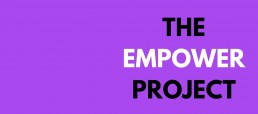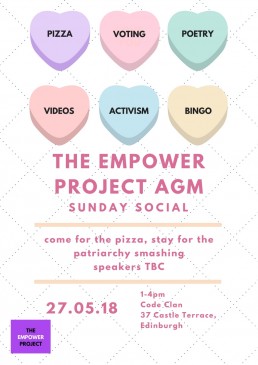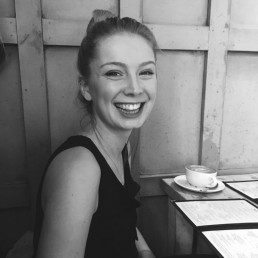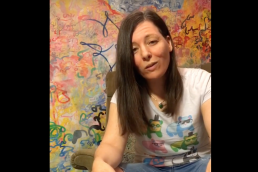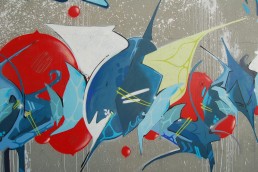by Anna Renfrew
Trip-trip-trapping over the bridge… Anna Renfrew explains some of the inspirational interventions, aims and impact of The Empower Project, an anti-troll organisation working to make online spaces safer and more nurturing of women and girls’ minds, bodies and brilliant individuality.
Young women are the highest-risk group for mental illness in the UK. Research estimates 46% of young women between 11 and 21 years old have sought out treatment for mental health conditions including anxiety, depression and eating disorders and with the rising pressures of social media and vulnerability online, these problems are growing.
Enter The Empower Project, an NGO (Non-governmental Organisation) based in Scotland and working to tackle the abuses young women face today by exploring creative ways to reclaim space, control and representation online. Happily, The Empower Project is also where I work and I couldn’t be prouder to be part of such a subversive, brazen initiative.
It’s clear that online spaces can be hazardous, particularly for women and girls who are exposed to trolling and misogynist abuse on ‘toxic’ Twitter and hit by an unrelenting, unrealistic, affirmation of ‘perfect’ body images on Instagram. Mhairi Black, MP for Paisley and Renfrewshire South, recently made a speech in the House of Commons recounting just a little of the misogyny she faces online every day; much of which focuses on her appearance. It’s a sobering watch and Black’s speech highlights without doubt that sexism’s still rampant in society at large, and also that in a world where communication is increasingly online, this sexism’s found new, insidious ways to channel abuse. Black’s experience is affirmation to the fact that this abuse targets victims of all backgrounds; that women in positions of power and authority are no more exempt from hate than anyone else online and, in fact, women in the public eye are often deliberately trolled and abused because of their position.
Dianne Abbott, Shadow Home Secretary at Westminster, has long been the subject of a shameful plethora of racist and sexist abuse. Abbott recently shared a tweet from Anthony Mullen, a then freshly elected Conservative Councillor for Sunderland, referring to her as ‘a filthy, bulbous pig’. Mr. Mullen, despite being suspended from the party, maintains his position at Durham University, demonstrating the extent to which this type of abhorrent behaviour is continuously downplayed, excused and renormalized; the backlash women face for having a voice signifies the persistence of those wishing to silence them.
Even as a relatively small organization, The Empower Project’s own Facebook page has been the subject of mindless, sexist abuse from trolls. To counteract exactly this kind of negativity online, our project works to promote online spaces in which women and girls can thrive and to this end we recently partnered with Amnesty International UK to hold a decoding event, specifically taking on Toxic Twitter. Together we assembled a Troll Patrol, designed to expose sexist, racist and other forms of abuse against women online and highlighting the failings of social media platforms to address the level of abuse permeating their sites.
Twitter prides itself as a place where everyone has, “the power to create and share ideas and information instantly, without barriers”, and in March 2018, it tweeted that it, “stands with women to make their voices heard”. However, Jack Dorsey, Twitter CEO, is being challenged on this ‘stand’ because women continue to be silenced and harassed on his platform. The Empower Project recently co-signed an open letter to Mr Dorsey in Grazia Magazine, calling on him to take action against online abuse in a more meaningful way than what cynics have described as empty claims of alliance. Initiatives such as the Troll Patrol are examples of how women are coming together in order to reclaim online space for themselves, a concept at the heart of projects such as The Empower Project and Fearless Femme alike.
The effects of social media on young women is at the forefront of many feminist agendas today as almost a quarter of women receive abuse online. Research has shown that psychological distress amongst young women is linked to harassment, but also the growing pressures that this group faces: pressures to look thick and thin in the ‘right’ places are the hallmarks of an age of ‘airbrushing’ and social media. These pressures can lead to low self-esteem and body image problems, with evidence suggesting that young girls start to worry about their body image from as young as eleven years old. The immediacy and pervasiveness of social media creates a relationship to online spheres that is constant, too; the performative nature of how you and others present online can be exhausting. Several months ago, scrolling through my Instagram feed, I realised with some shock that it consisted almost entirely of models, fashion magazines and other representations of unrealistic body standards. I like to think of myself as comfortable with myself and my body, but exposure to these images every day had started to affect what I thought of as normal. So, I’ve set about diversifying my feed and stopping following the most toxic sources of influence; the ones that made me feel everything apart from good.
The truth is most famous women curating an Insta feed don’t look in real life the same way as they present in pictures; they’re edited, they’ve used special lighting and many of them are actually suffering with their own image-related mental health challenges. The consequence is a cycle in which women and girls often judge their worth against a myth. This is a truth, which, though I know full well, I still, somehow, struggle to fully absorb.
Not to mention Snapchat, the pervasiveness of which, I actually think I had the privilege of growing up without. Young women today have this whole other sphere of social interactions to deal with and, often, to work out for themselves. This is precisely why organisations like The Empower Project and Fearless Femme are so important; we’re forging spaces for a community of people who want to celebrate women and girls, encourage self-expression and give young women an opportunity to be safely heard and seen. Some of the most life affirming articles I’ve read have been found on the internet and it’s vital that in response to the negativity found online, that there are spaces in which women can come together to empower one another. The Empower Project is part of a wider project building a sense of community that shows everyone, including trolls, there are allies whose experiences provide solidarity and comfort as well as spaces to grow from.
Most importantly perhaps, safe online spaces give women and girls opportunities to have fun online and celebrate themselves. In past events and at our upcoming AGM, The Empower Project’s striven to put the fun in fundamental change and encourage a joyful revolution. We’re an intersectional, feminist organization and believe that collaborating with other groups is key to building a community of people in resistance of abuse and existing inequalities. So, if these issues are important to you too and you can get to Edinburgh this weekend, why not come along to our AGM on 27th May? If you can’t make it but you still want to join in, follow us on social media or become a member, because there’s strength in numbers and, don’t forget, there’s togetherness and beauty in change, too.
Anna Renfrew
Anna has recently finished her undergrad in Edinburgh and is now pursuing female empowerment, advocacy and human rights projects. She currently volunteers with The Empower Project and The Circle. Anna loves Marvin Gaye and Glitter.

